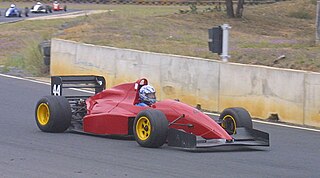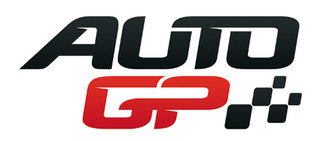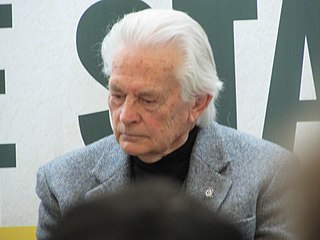
The Formula 3000 International Championship was a motor racing series created by the Fédération Internationale de l'Automobile (FIA) in 1985 to become the final preparatory step for drivers hoping to enter Formula One. Formula Two had become too expensive, and was dominated by works-run cars with factory engines; the hope was that Formula 3000 would offer quicker, cheaper, more open racing. The series began as an open specification, then tyres were standardized from 1986 onwards, followed by engines and chassis in 1996. The series ran annually until 2004, and was replaced in 2005 by the GP2 Series.
Lola Cars Limited is a British automobile manufacturer founded in 1958 by Eric Broadley in Bromley, England. The company is now owned by Till Bechtolsheimer, which he purchased in 2022. Lola Cars endured for more than fifty years to become one of the oldest and largest manufacturers of racing cars in the world. Lola started by building small front-engined sports cars, and branched out into Formula Junior cars before diversifying into a wider range of sporting vehicles. In 2012, Lola Cars stopped operations. The company is set to make a return to motorsport in 2024 by joining the Formula E World Championship in partnership with Abt Sportsline and Yamaha.
A1 Grand Prix (A1GP) was a "single-make" open-wheel auto racing series that ran from 2005 until 2009. It was unique in its field in that competitors solely represented their nation as opposed to themselves or a team, the usual format in most formula racing series. As such, it was often promoted as the "World Cup of Motorsport". The series was ratified by the Fédération Internationale de l'Automobile (FIA), and races were held in the traditional Formula One off-season, the northern hemisphere winter. The nation-based A1GP concept was founded by Sheikh Maktoum Hasher Maktoum Al Maktoum of Dubai, initially in 2003. After a successful first season of A1GP, it was announced on 29 September 2006 that Maktoum was to sell his position as chairman and director of A1GP. The transfer of his share in the organisation of A1 Grand Prix to RAB Capital was finalized in December 2006. Tony Teixeira took control of the series in 2006, and the series later liquidated after failing to host any races during the 2009–10 season.

Formula 5000 was an open wheel, single seater auto-racing formula that ran in different series in various regions around the world from 1968 to 1982. It was originally intended as a low-cost series aimed at open-wheel racing cars that no longer fit into any particular formula. The '5000' denomination comes from the maximum 5.0 litre engine capacity allowed in the cars, although many cars ran with smaller engines. Manufacturers included McLaren, Eagle, March, Lola, Lotus, Elfin, Matich and Chevron.

Formula racing is any of several forms of open-wheeled single-seater motorsport. The origin of the term lies in the nomenclature that was adopted by the FIA for all of its post-World War II single-seater regulations, or formulae. The best known of these formulae are Formula One, Formula E, Formula Two, Formula Three, regional Formula Three and Formula Four. Common usage of "formula racing" encompasses other single-seater series, including the IndyCar Series and the Super Formula Championship.

Formula Holden was an Australian open wheel racing category introduced in 1989.

Judd is a brand of racing car engines built by Engine Developments Ltd., a company founded in 1971 by John Judd and Jack Brabham in Rugby, Warwickshire, England. Engine Developments was intended to build engines for Brabham's racing efforts, and became one of the first firms authorised by Cosworth to maintain and rebuild its DFV engines, but has since expanded into various areas of motorsport.

The Lola A1GP was a vehicle designed to compete in the A1 Grand Prix. The car was standardised for every team to provide a level playing field for competing nations. It was designed to reduce the volume of "dirty air", allowing drivers to close in on the car in front, encouraging overtaking. The bodywork was mainly pre-impregnated carbon fibre composites. From 2008–09 Ferrari was consulted on the design and manufacture for all A1 Grand Prix cars. From the 2008-2009 season the Lola A1GP car was replaced by the A1GP Powered by Ferrari car.
The 1999 International Formula 3000 season was the thirty-third season of the second-tier of Formula One feeder championship and also fifteenth season under the International Formula 3000 Championship moniker which was an FIA sanctioned motor racing title for drivers of Formula 3000 racing cars. The title was contested over a ten-round series from 1 May to 25 September 1999. This was the first F3000 season in which every International Championship race took place during a Formula One weekend and supported the Grand Prix itself.
The BOSS GP Racing Series is a motor racing series in Europe. The category originated in 1995 as the BOSS Formula series and evolved into the EuroBOSS Series.

Auto GP, sometimes referred to as the Auto GP World Series and formerly known as both Euro Formula 3000 and the Euroseries 3000, was a European formula racing series.

The Lola B06/10 is a Le Mans Prototype developed by Lola Cars International for use in the LMP1 class of the American Le Mans Series, Le Mans Series, and 24 Hours of Le Mans. It was developed in 2006 as a replacement for the Lola B2K/10 as well as the MG-Lola EX257. It shared much of its mechanical elements and design with the LMP2 class Lola B05/40, which was developed the year prior.

Lola B05/52 is an open-wheel single-seater sports car developed by the British company Lola Racing Cars in 2005 and currently still in production.

Tony Southgate is an English engineer and former racing car designer. He designed many successful cars, including Jaguar's Le Mans-winning XJR-9, and cars for almost every type of circuit racing. He was responsible for the chassis design of Ford's RS200 Group B rally car. Southgate was employed as chief designer or technical director for many Formula One teams for over twenty years. These teams included BRM, Shadow and Arrows. Southgate retired after producing the Audi R8C, which was a major influence in the Bentley Speed 8, which won Le Mans in 2003. He continues to be a regular visitor to current and historic race meetings.
Acceleration 2014 was a multi-day festival combining top class car and bike racing with live music and other entertainment. The festival was organised by the International Sport Racing Association (ISRA), based in the Netherlands, and was held six times in 2014, starting 25–27 April in Portimao, Portugal and ending 17–19 October in Assen, Netherlands. The various racing competitions were Formula Acceleration 1 (FA1), the MW-V6 Pickup Series, the Legend SuperCup (LSC), the European Stock 1000 Series and the European Stock 600 Series. Competing drivers in one or more classes each drove a vehicle representing his or her country of origin.
The 2014 Formula Acceleration 1 season was a formula racing series that started over 25–27 April in Portimao, Portugal and ended over 17–19 October at the TT Circuit Assen, Netherlands. The series featured 12 teams that represented the nations in which they were founded. Their drivers did not have that nationality per sé, but the car represented the flag. This concept was similar to the one used in the former A1 Grand Prix series, whose vehicles were used in FA1. To attract young, yet serious, racing drivers, the 2014 winning driver/team was promised the full budget for the 2015 FA1 season and a test day in a GP2 Series car in Abu Dhabi.
The 2014 MW-V6 Pickup Series season was a pickup truck racing series that started over 25–27 April in Portimão, Portugal and ended over 17–19 October at the TT Circuit Assen, Netherlands. MW-V6 was a part of Acceleration 2014, a series of festivals combining top class car and bike racing with music and entertainment. Next to MW-V6, there was the Formula Acceleration 1, based on the former A1 Grand Prix, the Legend SuperCup, based on legends car racing, and the European Stock 600 and 1000 Series, which featured motorcycle racing for 15- and 16-year-olds. To attract young, yet serious, racing drivers, the 2014 MW-V6 winning driver was promised half the budget for the 2015 FA1 season and a test day in the FA1 car, or the full budget for the 2015 MW-V6 season plus an FA1 test. As for the music, on Friday evenings, David Hasselhoff hosted "Celebrate the 80's and the 90's with The Hoff", a dance party featuring 2 Unlimited, Haddaway, Kim Wilde, and others. Saturday evenings saw performances of international DJs.

The 2014 Legend SuperCup season was a legends car racing series that started over 25–27 April in Portimão, Portugal and ended over 17–19 October at the TT Circuit Assen, Netherlands. Legend SuperCup (LSC) was a part of Acceleration 2014, a series of festivals combining top class car and bike racing with music and entertainment. Next to LSC, there was the Formula Acceleration 1, based on the former A1 Grand Prix, the MW-V6 Pickup Series, based on the former Dutch racing series BRL V6, and the European Stock 600 and 1000 Series, which featured motorcycle racing for 15- and 16-year-olds. To attract young, yet serious, racing drivers, the 2014 LSC drivers' champion was promised half the budget for the 2015 MW-V6 Pickup Series season plus a test day in the MW-V6 car. As for the music, on Friday evenings, David Hasselhoff hosted "Celebrate the 80's and the 90's with The Hoff", a dance party featuring 2 Unlimited, Haddaway, Kim Wilde, and others. Saturday evenings saw performances of international DJs.

Luis Michael Dörrbecker Rebollar is a Mexican racing driver.
The Zytek ZA1348, also known as the Zytek ZA348, is a 3.4-liter, naturally-aspirated, V8 racing engine, designed, developed and produced by British manufacturer Zytek, between 2003 and 2004. It was specifically constructed and built as the spec-engine for the new A1GP open-wheel formula racing series, and debuted in 2005. It powered the Lola B05/52 A1 Grand Prix car. It produced between 520–550 hp (390–410 kW), and around 330 lb⋅ft (450 N⋅m) of torque. A slightly detuned version of the engine, producing around 400 hp (300 kW), but a similar torque figure of 326 lb⋅ft (442 N⋅m), was used in the Ginetta G50Z sports racing car. The engine itself is very light, weighing only 120 kg (260 lb), constructed out of cast aluminum alloy.











